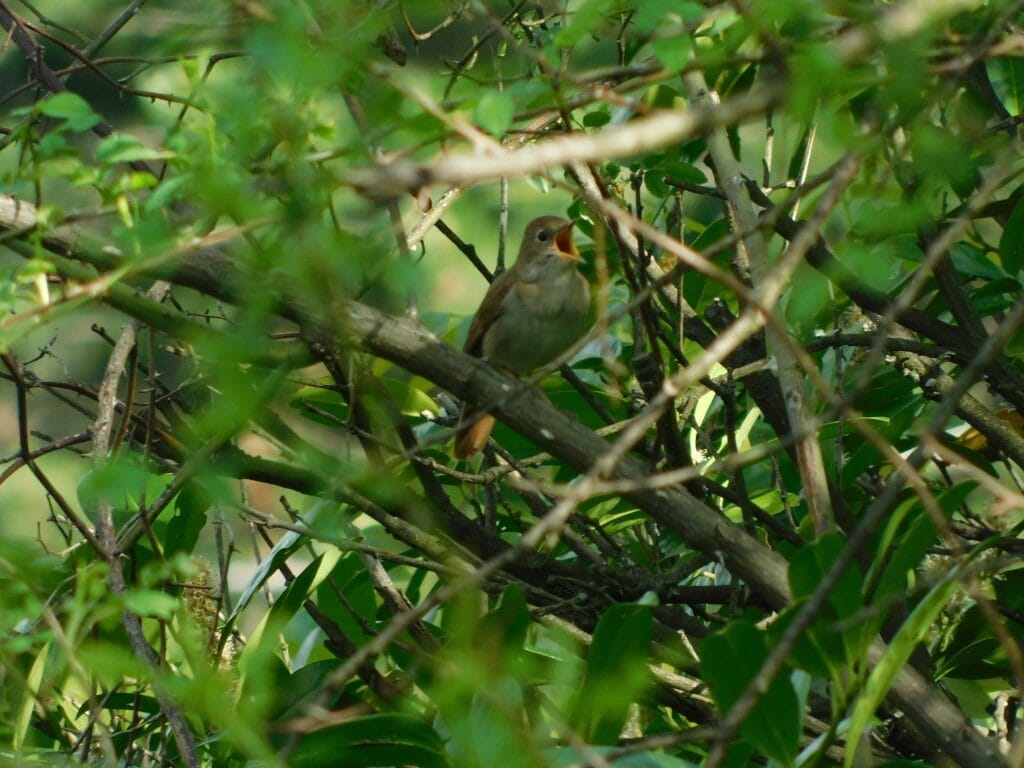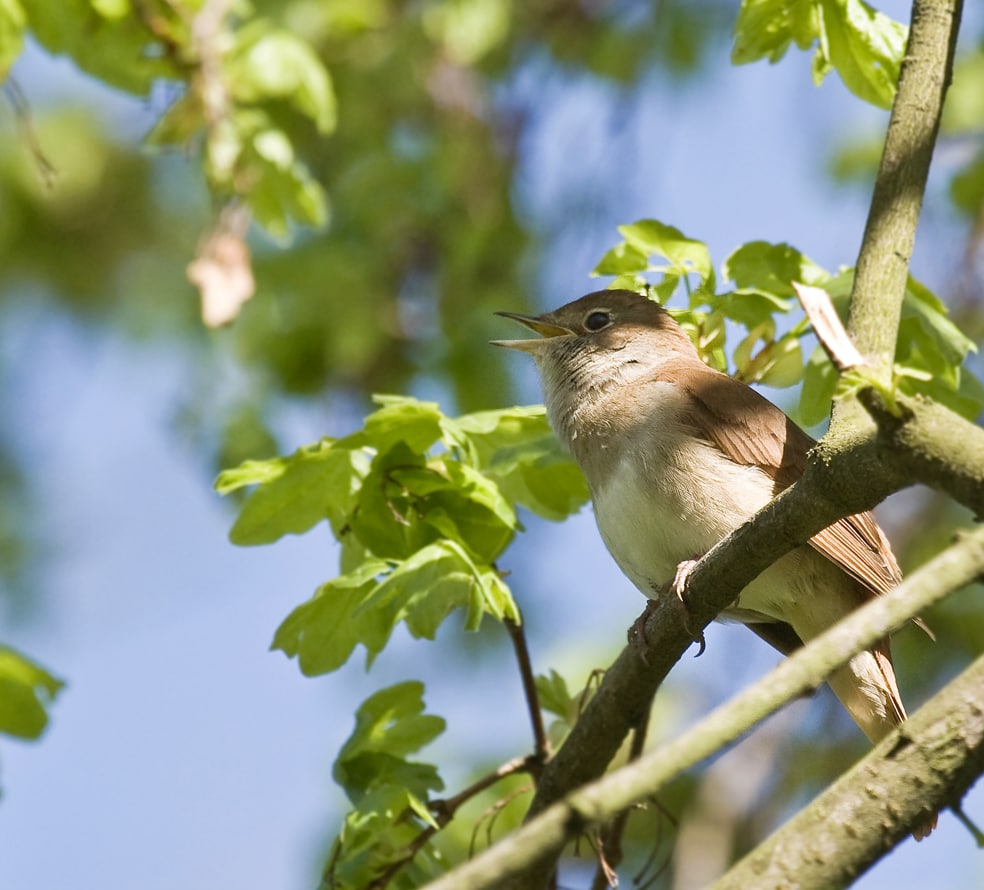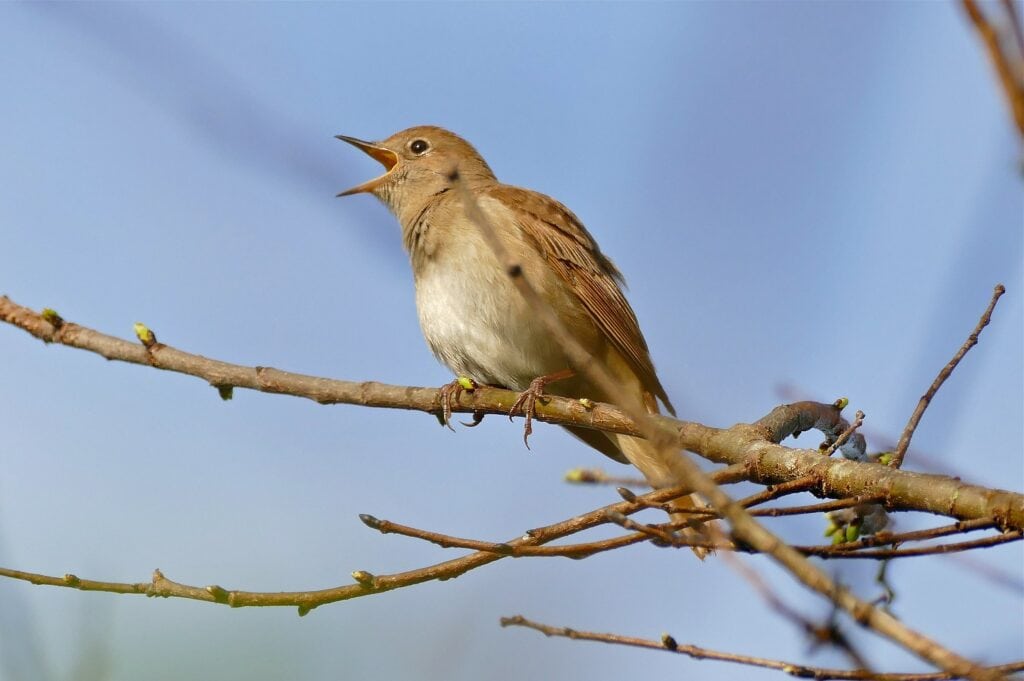The Nightingale is a bird that is famous for its night song. In fact, the word “Nightingale” comes from old Germanic words meaning “night” and “to sing.” Featured in many songs and poems, the diminutive Nightingale, and its associated Nightingale symbolism, seems to have a bewitching effect on mankind.
Nightingales were once thought of as members of the thrush family. Nowadays, however, these birds are classed as Old World flycatchers. The song of the Nightingale is widely admired. In stories and myths, the Nightingale is often portrayed as an enchanting but somewhat forlorn songstress. Despite commonly being portrayed as female, the Nightingales which are heard singing by moonlight are actually male. These Nightingale fun facts only add to the mystery and allure of this beloved songbird.
From classic fairytales to Greek myths, Nightingale’s beautiful voice and gentle presence is a source of both admiration and inspiration. In this article, we’ll look at a number of Nightingale stories as we explore the deep symbolism attached to this charming little bird!
Nightingale Symbolism and Meaning
Nightingales are most often associated with both beauty and melancholy. Perhaps because their songs break the silence of the night, Nightingales are presented in many stories as mournful birds. The Nightingale’s symbolism is also very often connected with artistry. Poets and musicians are often compared with Nightingales. Percy Shelley even compares poets to Nightingales in his “Defense of Poetry.”
“A poet is a nightingale, who sits in darkness and sings to cheer its own solitude with sweet sounds; his auditors are as men entranced by the melody of an unseen musician, who feel that they are moved and softened, yet know not whence or why.”
— Excerpt from Percy Shelley’s “Defense of Poetry”
The following poem is, perhaps, one of the most famous poems concerning the Nightingale. John Keats’ Ode to a Nightingale is a bit too long to include here in its entirety, however the excerpts included below demonstrate how entranced Keats is with the melodious voice of this bird.

“Thou wast not born for death, immortal Bird!
No hungry generations tread thee down;
The voice I hear this passing night was heard
In ancient days by emperor and clown:
Perhaps the self-same song that found a path
Through the sad heart of Ruth, when, sick for home,
She stood in tears amid the alien corn;
The same that oft-times hath
Charm’d magic casements, opening on the foam
Of perilous seas, in faery lands forlorn.
Forlorn! the very word is like a bell
— Excerpt from “Ode to a Nightingale” by John Keats
To toll me back from thee to my sole self!
Adieu! the fancy cannot cheat so well
As she is fam’d to do, deceiving elf.
Adieu! adieu! thy plaintive anthem fades
Past the near meadows, over the still stream,
Up the hill-side; and now ’tis buried deep
In the next valley-glades:
Was it a vision, or a waking dream?
Fled is that music:—Do I wake or sleep?”
Nightingale symbolism is also often connected with themes of springtime, rejuvenation, and romance. Shakespeare uses the Nightingale to represent the nighttime in Romeo and Juliet.
“Juliet: Wilt thou be gone? it is not yet near day:
— Romeo and Juliet, Act III Scene 5
It was the nightingale, and not the lark,
That pierced the fearful hollow of thine ear;
Nightly she sings on yon pomegranate-tree:
Believe me, love, it was the nightingale.
Romeo: It was the lark, the herald of the morn,
No nightingale: look, love, what envious streaks
Do lace the severing clouds in yonder east:
Night’s candles are burnt out, and jocund day
Stands tiptoe on the misty mountain tops.
I must be gone and live, or stay and die.”
In this passage, Romeo and Juliet argue over whether the birdsong they hear is the nighttime song of a Nightingale or the dawn chorus of a lark. Upon realizing that it is a lark after all, the lovers are forced to admit that it is morning and Romeo will be discovered if he does not flee. While the lark represents the hour at which they must say their goodbyes, the Nightingale represents the time in which they are safe to stay together. Thus, the Nightingale represents love, romance, and hope.
But, Nightingale symbolism also evokes the nostalgic sadness of their fleeting time together. In Romeo and Juliet, the nightingale symbolizes the bittersweet magic of a youthful romance doomed to burn brightly and snuff out quickly.

In fairytales, Nightingales often act as symbols of love, sacrifice, gentleness, and friendship. The Nightingale is sometimes used as a symbol of selflessness as well.
Nightingale Native American Symbolism
Nightingales are not found in the Americas. For Native American peoples, the most likely culprit behind a midnight birdsong would probably be a mockingbird. Many tribes associate mockingbirds with intelligence and protection.
Nightingale Christianity Symbolism
Shockingly, despite rampant connections between Nightingales and arts and literature, biblical connections to this bird are seemingly nonexistent. The Nightingale just doesn’t come up in Christian iconography very much. I am tempted to point out a tenuous connection between the mournful nighttime song of this bird, along with the misconception that night-singing Nightingales are female, and the Virgin Mary.
Mary is often depicted as a grieving mother and a gentle sorrowful figure who must allow her son to perish for the good of mankind. The Nightingale’s feminine associations and haunting mournful song means that Christian Nightingale symbolism may connect this bird to Mary.
Nightingale Celtic Symbolism
Celtic mythology treats songbirds as emissaries from the Otherworld. The haunting song of the Nightingale reinforces this idea while also connecting this bird to the birds of Rhiannon. Rhiannon, a Welsh goddess of femininity and queenship, is said to enchant visitors to the Otherworld with her choir of magical songbirds.
Nightingale Dream Symbolism
Dreaming of a Nightingale may indicate love or longing. Nightingale dream meanings tend to refer to the most vulnerable and emotional aspects of our personalities. A Nightingale’s song is alternatively connected with triumphant love and wistful loneliness. So, a Nightingale dream may represent either one’s affection for a significant other, or one’s loneliness and desire for such a connection. A Nightingale in a dream can represent an unrequited love as well.
Dreaming of Nightingales may also symbolize artistry or expression. Nightingales are often thought of as muses or as artistic masters of song. The symbolism of a Nightingale dream might refer to a desire to express oneself through art.
Nightingales are closely associated with nighttime due to their habit of singing through the night. Dreaming of a Nightingale may simply be a sign of a restful and rejuvenating sleep.
Nightingale Encounters and Omens
Encountering a Nightingale may be seen as a sign that springtime is near. Nightingales are often connected with the rebirth and renewal that the start of springtime brings. A Nightingale encounter may also signify rest and healing. Along with the coming spring, Nightingales are connected with the soothing peace of the night. Their songs are sometimes thought of as lullabies that bring rest to slumbering people.
A Nightingale encounter may signify a desire to connect with others on a deep level. Nightingale songs are often associated with longing. Hearing a Nightingale singing may mean that you feel a deep desire to have your own song answered in kind by someone who understands you.
Nightingale in Mythology & Folklore
The most famous Nightingale story comes from The Little Mermaid‘s author, Hans Christian Andersen. Andersen wrote The Nightingale in 1844 and its themes are still strongly associated with Nightingale literary symbolism to this day. The Nightingale is set in China and follows the story of a spoiled emperor who discovers that his own garden is home to the greatest singer anyone has ever heard. When the emperor hears rumors that a Nightingale in his garden can sing so well that it makes people forget their troubles, he orders it brought to him. The Nightingale sings for the emperor and he is moved to tears. He offers the Nightingale a reward, but she refuses as she is pleased enough to have made the emperor cry.
For a while, the emperor keeps the Nightingale in his court and she is a major sensation. Eventually, though, she begins to miss the garden. At the same time, the emperor is gifted a jeweled mechanical Nightingale which can sing tirelessly. He begins to favor this new toy and doesn’t really notice when his Nightingale friend escapes back to the garden. When it is noticed that she is gone, the Nightingale is banished as punishment. Before long, though, the mechanical Nightingale begins to grow repetitive and eventually breaks down. The people of the court are forced to admit that the real Nightingale’s music was unmatched in its natural beauty. Around this time, the emperor falls ill and is believed to be on his deathbed. Before the emperor can die, the real Nightingale returns and sings for him. After all the ways he has neglected her, she is still grateful for his appreciation of her music and she agrees to sing at his window each night forevermore. The song of the Nightingale heals the emperor who is grateful for his winged friend.
This story is one of the major reasons why Nightingales continue to be connected with both unconditional love and healing. Despite being neglected, underappreciated, and banished, the little Nightingale is still full of gratitude for the way that the emperor first responded to her song. She selflessly chooses to help him even though he had betrayed her. Nightingale symbolism in literature tends to connect this bird to both love and sacrifice.
Greek Mythology:
The Greek myth of Philomela and Procne is one which features the Nightingale. According to legend, Philomela was the sister of Procne who was the wife of a man named Tereus. Tereus was the son of Ares, and the king of Thrace. Tereus and Procne had a son and ruled over Thrace together. One day, Procne came to Tereus and begged him to allow her beloved sister, Philomela, to come to Thrace and visit them. Tereus agreed and Philomela came to stay with them in Thrace. While Philomela was visiting, Tereus began to harbor lust for his sister’s wife and decided to lure her into the woods so that he could rape her. After assaulting Philomela, Tereus cut out her tongue so that she could tell no one what had happened to her. Philomela was clever, though, and she wove the events into a tapestry that she brought to Procne. Procne was enraged and the sisters swore to get their revenge. They slew Procne and Tereus’s son and fed him to his father. When Tereus learned that he had eaten his own child, he chased the sisters down and tried to kill them both. In their panic, Procne and Philomela begged for assistance from the gods. The gods took pity on the entire ill-fated family and transformed each of them into birds. Procne became a swallow and Tereus was transformed into a Hoopoe. Philomela, who had once had her voice stolen from her, became the Nightingale so that she could sing again.
Nightingale Spirit Animal
If your spirit animal is the Nightingale then you are likely an artist at heart. People with the Nightingale spirit animal are often blessed with artistic talent. They tend to feel a major drive to express their ideas by creating something exciting and new. The Nightingale spirit is inventive and drawn towards experimenting with new ideas.
If your spirit animal is the Nightingale then you may seem secretive and mysterious to others. People who don’t know you well may fail to see your true nature. The truth is that the Nightingale spirit, while not exactly a social butterfly, longs to connect with others on a meaningful and intimate level.
Nightingale Totem Animal
If your totem animal is the Nightingale then you are someone who is selfless and compassionate. People with the Nightingale totem are gifted with the rare ability to forgive entirely. While forgiveness may not be easy to do, the Nightingale totem knows how freeing it can be to let go of anger and choose to see the good in others.
The Nightingale totem animal enjoys soothing the pain, suffering, and guilt of those around it.
Nightingale Power Animal
The power of the Nightingale is rest. The song of the Nightingale is like a lullaby that brings serenity and healing to everyone who hears it. This bird has the amazing power to communicate to everyone around that everything will be okay. The Nightingale power animal is an incredible antidote to anxiety.
People with the Nightingale as their power animal are natural healers who take great joy in comforting others.
Nightingale Tattoo Meaning
A Nightingale tattoo may symbolize art, creativity, love, longing, grief, or triumph. Somebody who chooses a Nightingale tattoo might do so to express a love for poetry or literature. The Nightingale is one of the most popular avian subjects of poetry and seems to have been a favorite of William Shakespeare.
Here’s a list of possible Nightingale tattoo meanings to help you decide if a Nightingale tattoo is the right fit for you:
- Romance
- Love
- Art
- Self-expression
- Vulnerability
- Mystery
- Rest
- Rejuvenation
A Nightingale tattoo may also represent selflessness or sacrifice. The possible meaning of a Nightingale tattoo will be different depending on the context, but it helps to learn about the common symbols associated with this bird.
Conclusion
The Nightingale may be the most symbolism-rich bird in all of literature and poetry. To be quite frank, there is far too much material concerning this lovely little songbird for us to scratch the surface in a single article. From love and romance to loneliness, the Nightingale’s song has an uncanny ability to speak to the human heart and inspire a range of emotions.

